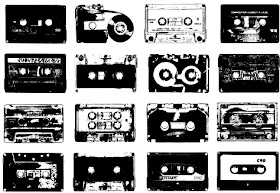Sunday, 19 August 2012
Retromania
I've been reading Simon Reynolds' Retromania book and it's pretty clear that I'm part of the problem. Reynolds has an encyclopedic knowledge of music and has spent the last thirty years being constantly excited by the new (from post punk into dance/rave). He contends that at some point after the mid 90s music stopped being about forward thrust and has turned in on itself, devouring it's own recent past. Re-issues, re-unions, reformations, revivals, revivalists (Mod, northern soul), anniversaries, remakes, the internet (especially the access to everything now! that ipods and youtube offer), retro sounds, mash-ups, re-edits, vintage- these are the driving forces of music now. He struggles to find any new form of music since 2000 that has jettisoned all previous forms and created something entirely new, and says that even the more forward thinking areas have only really touched up or refined already existing forms (dubstep and grime for example). Vintage and retro get chastised fully, while he recognises that nostalgia for the future (a 50s/60s view of the future) is part of his own worldview. He praises analogue over digital while acknowledging this is itself retro. He discusses sampling widely, forcing himself into an anti-sampling point of view while praising those who pioneered it (Coldcut say). He admits hunting down old vinyl while also constantly wanting the rush of hearing something he's never heard before. Reynolds writes about boxed sets- their tomblike quality, the lovely booklets and ephemera, the way they sit on the shelf, yet admits they never get listened to all the way through, certainly not in one sitting. Music's only revolution since 2000 has been in the way it is consumed and available, transferred instantly from computer to computer, recorded in digital brightness, carried around and heard all the time but not ever really listened to, all music ever available on your phone. It's difficult to argue with much of his thinking- I've moaned about aspects of it myself while still taking part in it. He also points the finger at artists and things I love- Billy Childish, St Etienne, vintage culture (clothes, vinyl etc) to pick three random examples. He also accepts (I think) that music's progressive nature from 1963 through to the mid 90s maybe is a one off and that the scientific idea of linear progression shouldn't necessarily apply to musical artforms. Interestingly, he also identifies 1967 as the year retro began, when Edwardian military jackets became fashionable rather than modernist clothing, when back to basics and a rejection of psychedelia and going back to older forms (The Band etc) began. A lot of food for thought.
This blog is also part of the problem (rather than a solution he's looking for). Much of the stuff I post here is old (this isn't a new music blog, I don't have the time or perhaps the inclination to solely focus on new music or the search for it). It has a pick 'n' mix aesthetic (this is not a niche blog, it's scattergun like the shuffle function). It gets nostalgic (although let's remember the literal translation of nostalgia is the pain of looking back, rather the rosy glow that it gets tarred with). It takes advantage of being able to distribute music via modern technology, providing people with tinny, compressed mp3s. But, hey ho, I don't think it's going to change. Here's something old from Motown. And if that sounds a bit a bit glib, sorry Simon.
It's A Shame

nice post, that book sounds like a good read....I also love analogue and spent the past week going through and playing my old tapes and marveling at the sound but then I also download songs in mp3 format....best of both worlds maybe?
ReplyDeletealways struck me that a relentless futurism risk us overlooking good things from the past or acknowledging the way that the past affects the future. we are largely where we've come from. anyway, that's my excuse for starting Acid Ted with a focus on the past which has been overtkane by a focus on the present.
ReplyDeletectel
...but don't we (40+ age) take music too seriously? And as you say, there is new music out there but it's more difficult for us to access, really, as we probably do have more responsibilities than we did 20 years ago. We can't put the radio on at a certain time and know there's someone out there who's going to play new (and occasionally old) records we will mostly like...he's dead. And maybe it's Simon Reynolds who's the real nostalgic, saying today's e?is not as good as it used to
ReplyDeleteAgree with both of Ctel and George. I find his constant quest for the new a bit exhausting tbh. I thought the book raised lots of interesting points and I think he's right about how technology has affected music but didn't agree with all of his arguments. Besides, I like old stuff.
ReplyDeleteso we can look forward to more Rockabilly on fridays?
ReplyDeleteYup. Rockabilly just keeps on coming.
ReplyDeleteI got really frustrated with the book and gave up about chapter 3 when I realised that life was too short and while I was reading somebody's pontifications on retro music, there were hundred if not thousands of forty year old soul obscurites I hadn't heard yet.
ReplyDeleteIs E worse than it used to be?
ReplyDelete